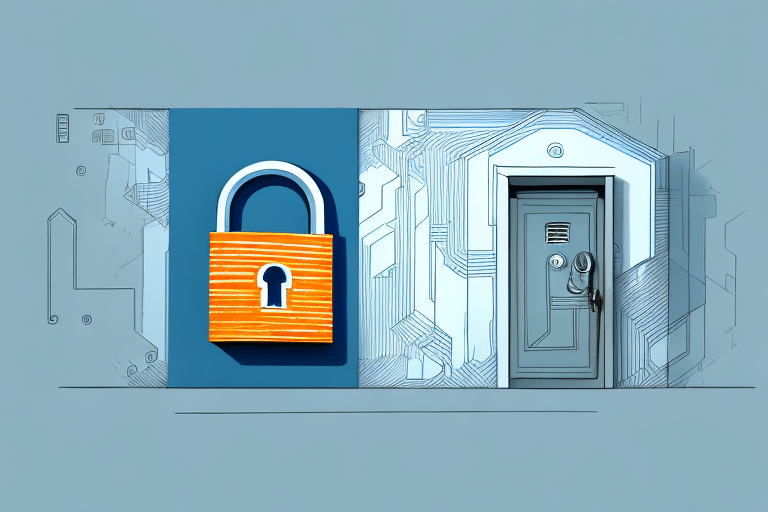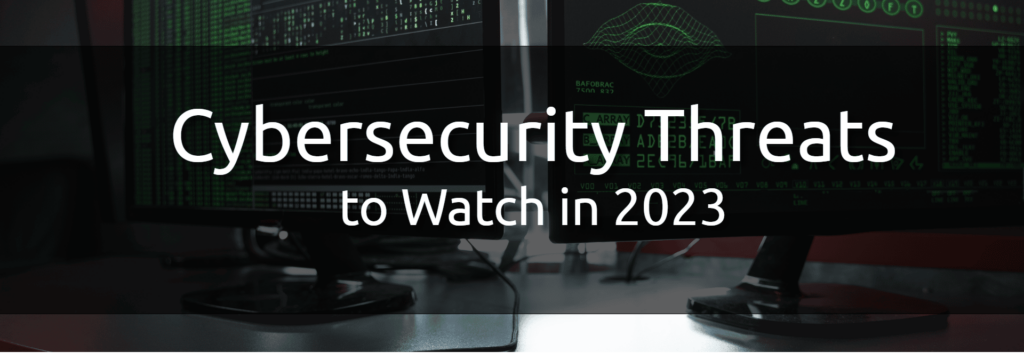The ever-increasing use of technology has transformed many industries, and the real estate sector is no exception. From digital transactions to online property listings, the industry has become increasingly reliant on technology to conduct transactions and manage sensitive client information.
While these technological advancements have brought greater convenience and accessibility to the industry, they have also brought about new cyber risks that require a proactive approach to ensure the protection of property and clients.
On This Page:
The Growing Importance of Cybersecurity in Real Estate
The real estate industry has always been a lucrative target for cybercriminals due to the high value of its assets. However, with the rise of digital transactions and remote work, the industry has become even more vulnerable to cyber risks.
The value of real estate data has increased significantly, making it an attractive target for cybercriminals who seek to exploit it for financial gain.
The Rise of Digital Transactions and Remote Work
The COVID-19 pandemic has accelerated the shift towards remote work and online transactions. While this has provided many benefits, it has also created new opportunities for cybercriminals. Phishing scams, in particular, have become more prevalent, with cybercriminals using social engineering tactics to trick individuals into divulging sensitive information.
Real estate companies are not immune to these threats. In fact, they are particularly vulnerable due to the large sums of money involved in real estate transactions. A successful cyber attack can result in significant financial losses for both the company and its clients.
The Increasing Value of Real Estate Data
Real estate data has become a valuable commodity for cybercriminals. This includes information about properties, clients, and financial transactions. Cybercriminals can use this information to commit identity theft, fraud, and other malicious activities. Therefore, it is essential to protect this sensitive data from unauthorized access.
Real estate companies must ensure that their cybersecurity policies are up-to-date and robust enough to thwart cyber attacks. This includes implementing strong passwords, two-factor authentication, and other security measures to protect sensitive data.
The Potential Impact of Cyber Attacks on the Industry
The impact of a successful cyber attack or data breach on a real estate company can be devastating. Financial losses, legal liability, and damage to the company’s reputation are just a few of the potential consequences. Clients can also suffer significant losses if their personal and financial information is compromised.
Real estate companies must take cybersecurity seriously and invest in the necessary resources to protect themselves and their clients. This includes educating employees on cybersecurity best practices and regularly updating their security measures to keep up with the evolving threat landscape.
Common Cyber Threats in Real Estate

The real estate industry is not immune to cyber attacks, and there are various cybersecurity threats that companies should be aware of. Let’s discuss some of the most common cyber threats faced by the industry and how to prevent them.
Phishing and social engineering attacks are some of the most common cyber threats faced by the real estate sector. These attacks usually involve fake emails and websites, tricking users into divulging sensitive information such as login credentials and personal data.
These attacks can be prevented by educating employees on how to identify and avoid phishing scams. Companies should also implement multi-factor authentication to protect against unauthorized access.
It is important to note that phishing attacks are becoming more sophisticated, and attackers are using more convincing tactics to trick users and gain access to financial and customer data. For example, attackers may use a spoofed email address that appears to be from a legitimate source, or they may create a fake login page that looks identical to the real one.
Ransomware and Malware
Ransomware and malware attacks can result in significant financial losses and damage to a company’s reputation. Ransomware can hold entire systems hostage and demand a ransom to release them, while malware can cause data breaches and compromise sensitive information. To prevent these types of attacks, companies should implement strong antivirus software, keep software up to date, and regularly back up data.
It is also important to have a response plan in place in case of a ransomware or malware attack. This plan should include steps for isolating infected systems, restoring data from backups, and contacting law enforcement if necessary.
Data breaches can have severe consequences for clients, leading to identity theft, fraud, data theft, and other malicious activities. Unauthorized access to an organization’s data can result in significant financial losses and the exposure of confidential information. To prevent a data breach, companies should implement strong access controls, encrypt sensitive data, and regularly monitor their networks for suspicious activity.
If a data breach does occur, it is important to have an incident response plan in place. This plan should include steps for notifying affected clients, conducting a thorough investigation, and taking steps to prevent future breaches.
Insider Threats and Human Error
Insider threats are a growing concern in the industry, as employees with malicious intent can cause catastrophic harm to a real estate organization’s computer systems.
Human error, such as weak passwords and poor security practices, can also lead to cybersecurity breaches.
To prevent insider threats, companies should implement strong access controls, monitor employee activity, and conduct regular security awareness training.
It is also important to encourage employees to report any suspicious activity or security incidents immediately. This can help prevent potential breaches and minimize damage if a breach does occur.
Protecting Sensitive Client Information

Protecting sensitive client information is a top priority for any real estate company. With the increasing threat of cyber attacks, it is essential to implement strong cybersecurity policies and procedures to prevent breaches and mitigate the impact of any successful attacks.
Real estate companies hold a vast amount of sensitive information, including personal details, financial information, and property information. This information is highly valuable to cybercriminals and can be used for fraudulent activities, making it crucial for companies to take necessary measures to protect it.
Implementing strong data encryption
Data encryption is one of the most effective ways to protect information from unauthorized access. Encryption should be used to secure sensitive client data, both in transit and at rest. Encryption algorithms, such as Advanced Encryption Standard (AES), can provide strong protection for data.
It is also essential to ensure that encryption keys are adequately managed and stored securely to prevent unauthorized access to encrypted data.
Regularly updating software and systems
Regular software updates and system checks can help keep networks safe from cyber threats. Companies should have a well-defined schedule for updates and ensure that all software and hardware are up to date with the latest security patches.
Outdated software and systems can have vulnerabilities that cybercriminals can exploit to gain unauthorized access to sensitive information. Therefore, it is essential to keep all systems up to date and regularly check for any security gaps.
Establishing secure communication channels
Companies should establish secure communication channels, such as email and messaging services, to reduce the chances of phishing and social engineering attacks. Establishing secure channels can help verify the authenticity of communication while providing a secure avenue for exchanging sensitive information.
It is also essential to educate employees on how to identify phishing and social engineering attacks and report any suspicious activities to the IT department.
Educating clients on cybersecurity best practices
As part of the company’s cybersecurity policies, clients should be educated on basic cybersecurity best practices, such as using strong passwords, avoiding public Wi-Fi, and being vigilant about suspicious emails or messages.
Real estate companies should also provide guidance on how clients can protect their sensitive information and report any suspicious activities promptly.
Safeguarding Property Data and Transactions

The real estate industry faces unique challenges in safeguarding property data and transactions. With the increasing use of technology in the industry, proper cybersecurity protocols can help mitigate the risk of threats while protecting property and clients.
Real estate companies must prioritize the security of their online payment systems to prevent data breaches. Online payment systems should be secure and comply with industry standards. Companies can use third-party payment services that are PCI-compliant and offer secure payment options to ensure that clients’ financial information is protected.
Ensuring Secure Online Payment Systems
It is essential to ensure that online payment systems are secure. Companies can implement measures such as encryption, tokenization, and fraud detection to prevent unauthorized access to sensitive financial information. Additionally, companies must ensure that their payment systems comply with industry standards and regulations, such as the Payment Card Industry Data Security Standard (PCI DSS).
Verifying the Authenticity of Property Listings
Scams involving fake property listings are becoming more prevalent, and companies must take proactive steps to verify the authenticity of the listing before transactions occur. Proper validation procedures can help prevent clients from falling prey to scams.
One way to verify the authenticity of a property listing is to cross-check the information provided with public records. Companies can also use third-party service providers that specialize in verifying the accuracy of property listings. It is essential to ensure that all property listings are legitimate before allowing transactions to occur.
Monitoring and Controlling Access to Property Data
Access to property data should be monitored and regulated to prevent unauthorized access. Employees should only be given access to property data on a need-to-know basis.
Companies can use access control mechanisms such as role-based access control (RBAC) and attribute-based access control (ABAC) to ensure that only authorized personnel can access sensitive property data.
Implementing Multi-Factor Authentication
Multi-factor authentication (MFA) is a powerful tool for preventing unauthorized access to sensitive data. It adds an extra layer of security to online transactions and can significantly reduce the risk of cyber attacks.
Companies can implement MFA by requiring users to provide two or more forms of identification, such as a password and a security token. Additionally, biometric authentication methods, such as fingerprint scans or facial recognition, can be used to further enhance security.
Building a Cybersecurity Culture within Real Estate Organizations

Building a cybersecurity culture is crucial in ensuring proper protection of property and clients. Organizations must take proactive steps to build a solid cybersecurity culture and instill best practices into the DNA of their operations.
Developing comprehensive cybersecurity policies
Developing comprehensive cybersecurity policies is essential to establishing a strong cybersecurity culture. Policies should be tailored towards the unique needs of the organization, outlining the procedures and guidelines employees must follow to mitigate cybersecurity risks. Policies should cover areas such as password management, access control, data protection, and incident response.
It is important to ensure that policies are regularly reviewed and updated to keep up with the changing cybersecurity threat landscape. Regular policy reviews can help to identify areas that require improvement and ensure that policies remain relevant and effective.
Providing regular employee training and awareness programs
Frequent employee training and awareness programs can help employees understand the latest cyber risks and how to prevent them. Employees should be schooled on cybersecurity best practices, phishing scams, social engineering, and other malicious activities. Regular training can help to reinforce the importance of cybersecurity and ensure that employees remain vigilant against potential threats.
Training should be tailored to the specific needs of the organization and delivered in a way that is engaging and accessible to all employees. This can include online training modules, classroom sessions, or workshops.
Establishing incident response plans
Companies should have a well-crafted incident response plan that outlines the procedures to follow in the event of a successful cyberattack. The procedures should be rehearsed regularly to familiarize the staff, allowing them to handle the situation efficiently. Incident response plans should cover areas such as containment, investigation, and recovery.
It is important to ensure that the incident response plan is regularly reviewed and updated to reflect changes in the threat landscape and to incorporate lessons learned from previous incidents. This can help to ensure that the organization is well-prepared to respond to any future incidents.
Collaborating with cybersecurity experts and partners
Collaborating with cybersecurity experts and other partners can provide valuable help and advice in securing systems and preventing attacks. Companies can obtain advice on the latest cybersecurity best practices, training, assessments, and remediation services. Partners can also provide access to threat intelligence and other resources that can help organizations to stay ahead of the evolving threat landscape.
It is important to choose partners carefully and to ensure that they have the necessary expertise and experience to provide effective cybersecurity support. Regular communication and collaboration can help to build strong relationships and ensure that the organization is well-supported in its cybersecurity efforts.
Throughout his FBI career, John Iannarelli has investigated cybercrime, including hackers, ransomware attacks, cyber fraud, and online predators, for which he worked closely with the National Center for Missing and Exploited Children.
Contact John today for a free consultation.
Cyber Insurance for Real Estate
Cyber insurance is designed to cover losses and expenses should a cyber incident occurs. Real estate professionals need to consider not only the potential loss of client funds and information but the potential legal expenses along with the cost of government-mandated client notification. Real estate professionals can benefit by having insurance protection against cyber threats.
Likewise, because it is in the insurance industry’s best interest to reduce avoidable claims, most cyber insurance will work with real estate companies and brokers to help them understand their exposure and improve their risk.
Through risk assessment and risk management, cyber insurance can prove to be money well spent in avoiding a cyber-attack.
The Future of Cybersecurity in Real Estate
Technology will continue to shape the real estate sector’s trajectory. Companies must remain vigilant in adapting to the rapidly changing cybersecurity landscape.
Emerging Technologies and Their Impact on Security
New technologies such as artificial intelligence, the Internet of Things, and blockchain will continue to shape the real estate industry’s future. Companies must ensure that they incorporate the appropriate security measures to protect these advancements.
The Role of Government and Industry Regulations
The real estate industry will likely face increased scrutiny from regulators over its cybersecurity policies and practices. Companies must ensure that they comply with industry standards while continuing to build a strong culture of security.
Preparing for New and Evolving Cyber Threats
The cybersecurity threat landscape is continually evolving, and cybercriminals are becoming bolder and more sophisticated. Companies must be proactive in preparing for new and evolving threats, building robust and scalable security protocols that can withstand online attacks.
Conclusion
The digital transformation of the real estate industry has brought many benefits, but it has also made the industry more vulnerable to cyber threats. Companies must take proactive steps to protect sensitive data, safeguard property transactions, and build a robust cybersecurity culture.
By following cybersecurity best practices, implementing robust policies, and collaborating with cybersecurity experts and partners, real estate companies can fortify their defenses and protect clients and property from cyber attacks.



